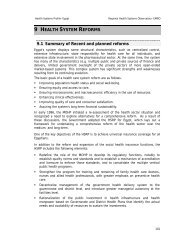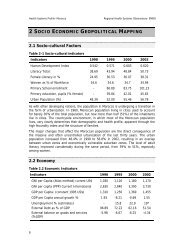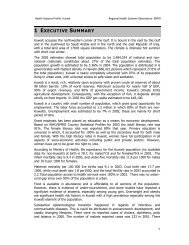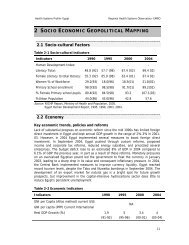The role of contractual arrangements in improving health sector ...
The role of contractual arrangements in improving health sector ...
The role of contractual arrangements in improving health sector ...
Create successful ePaper yourself
Turn your PDF publications into a flip-book with our unique Google optimized e-Paper software.
Jordan<br />
monitor<strong>in</strong>g adm<strong>in</strong>istrative <strong>arrangements</strong> to ensure that providers adhere to the<br />
conditions specified <strong>in</strong> each agreement.<br />
<strong>The</strong> fee-for-service system, which is prom<strong>in</strong>ent at the M<strong>in</strong>istry <strong>of</strong> Health,<br />
creates <strong>in</strong>centive for conduct<strong>in</strong>g multiple, sometimes unnecessary procedures, as well<br />
as over-bill<strong>in</strong>g by providers. As this type <strong>of</strong> payment mechanisms has proved to be<br />
less efficient worldwide and does not promote equity and quality (Hsiao W., 1997),<br />
the M<strong>in</strong>istry <strong>of</strong> Health has <strong>in</strong>troduced new payment mechanisms such as leas<strong>in</strong>g<br />
private hospital beds for a fixed payment per bed or a def<strong>in</strong>ed payment for a bundle<br />
fee per episode. <strong>The</strong> HID has also <strong>in</strong>itiated steps to computerize its entire account<strong>in</strong>g<br />
system and network it with other governorates.<br />
<strong>The</strong> M<strong>in</strong>istry <strong>of</strong> Health, with technical support from PHRplus project (funded by<br />
USAID), is now implement<strong>in</strong>g a Health Insurance Pilot Project (HIPP) to expand the<br />
adm<strong>in</strong>istrative and technical capacity <strong>of</strong> the staff <strong>of</strong> the HID <strong>in</strong> the areas <strong>of</strong> contract<br />
design, contract monitor<strong>in</strong>g and contract enforcement. This pilot project is based open<br />
bidd<strong>in</strong>g procedures and is expected also to have a positive impact on improv<strong>in</strong>g<br />
contract<strong>in</strong>g skills <strong>of</strong> private hospitals.<br />
<strong>The</strong> exist<strong>in</strong>g bureaucratic set-up <strong>of</strong> the M<strong>in</strong>istry <strong>of</strong> Health does not provide the<br />
Health Insurance Directorate (HID) with sufficient authority and flexibility to manage<br />
contracts efficiently. <strong>The</strong> laws govern<strong>in</strong>g the HID are <strong>in</strong>flexible and the decisions<br />
related to <strong>contractual</strong> <strong>arrangements</strong>, <strong>in</strong>clud<strong>in</strong>g reimbursement rates, are taken at the<br />
central level <strong>of</strong> the M<strong>in</strong>istry <strong>of</strong> Health. <strong>The</strong> civil <strong>health</strong> <strong>in</strong>surance budget is also<br />
managed at the central level and it is outside the control <strong>of</strong> its managers. This<br />
exogenous budget<strong>in</strong>g system affords very little control or <strong>in</strong>dependence <strong>in</strong> f<strong>in</strong>ancial<br />
decision-mak<strong>in</strong>g or monitor<strong>in</strong>g expenditures (Jordan’s National Health Accounts,<br />
Draft Report, 2004)<br />
Some genu<strong>in</strong>e efforts have been made recently by the HID to undertake cost<br />
and price analysis prior to negotiations for new contracts. <strong>The</strong> lack <strong>of</strong> comprehensive<br />
and advanced computerized <strong>in</strong>formation system is a real obstacle fac<strong>in</strong>g the<br />
development <strong>of</strong> these efforts. Capacity to undertake a price and cost analysis also<br />
needs urgent strengthen<strong>in</strong>g <strong>in</strong> order to expand <strong>health</strong> <strong>in</strong>surance coverage through<br />
<strong>health</strong> <strong>in</strong>surance reform which is considered now a top national <strong>health</strong> priority.<br />
Monitor<strong>in</strong>g and controll<strong>in</strong>g the quality <strong>of</strong> the contracted services is one <strong>of</strong> the<br />
major challenges fac<strong>in</strong>g the M<strong>in</strong>istry <strong>of</strong> Health. Current monitor<strong>in</strong>g procedures for<br />
contracts are not efficient, especially for measur<strong>in</strong>g the quality and appropriateness <strong>of</strong><br />
the <strong>health</strong> services provided by the private <strong>sector</strong>.<br />
Private <strong>sector</strong> capabilities, strengths and weaknesses regard<strong>in</strong>g contract<strong>in</strong>g<br />
Compared with the public <strong>sector</strong>, the private <strong>sector</strong> has better capabilities and<br />
experience <strong>in</strong> terms <strong>of</strong> technical and f<strong>in</strong>ancial management capacity. Most private<br />
hospitals have <strong>in</strong>troduced computerized <strong>in</strong>formation systems to manage their<br />
120
















